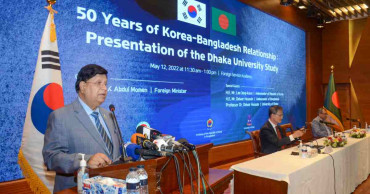Seoul
Aminul Islam set to become first Bangladeshi professional boxer to compete in South Korea
Bangladesh is poised to make an indelible mark on the international boxing stage as Aminul Islam, a trailblazer from Xcel Sports Promotion, is set to participate in the “Rings of Champions” boxing event. This landmark engagement will take place at the prestigious Grand Swiss Hotel in Seoul on March 16, 2024, marking Aminul’s debut as the first Bangladeshi professional boxer to compete in South Korea.
Aminul Islam, a celebrated figure in professional boxing, is slated to face Dong Hoon Jang, South Korea’s leading Bantamweight boxer, in a highly anticipated match. This encounter, a collaboration between Xcel and DND Promotions, is not just a bout but a milestone event expected to captivate boxing aficionados across the globe.
Premier Div Hockey: Usha KC return to winning ways beating Ajax SC 4-2
The bout is set to unfold over six intense rounds within the Bantamweight division, which has a weight limit of 54 kg. This confrontation is the culmination of rigorous preparation, with both fighters gearing up to showcase their prowess in what promises to be an unforgettable clash. The weigh-in, a precursor to the tension-filled event, is scheduled for March 15, 2024, setting the stage for the next day’s epic encounter.
Adnan Haroon, chairman of Bangladesh Boxing Foundation, conveyed his enthusiasm, stating, “Aminul's participation in this historic event marks a significant milestone for Bangladeshi boxing. His dedication and hard work reflect the spirit of our boxing community. It’s a proud moment for our nation as we witness our athletes showcase the talent and potential of Bangladesh on the international stage.”
This ground-breaking venture not only highlights Aminul Islam’s foray into the South Korean boxing scene but also symbolises a significant leap for Bangladeshi sports, inspiring future generations to dream big. As Islam steps into the ring, he carries not just the weight of expectation but the hopes of a nation eager to establish its presence on the world stage.
Sura Krishna shines at ‘Path to Glory: Hustle in Dhaka Square’ boxing tournament
1 year ago
N. Korea insults Biden, slams defense agreement with Seoul
The powerful sister of North Korea’s leader says her country would stage more provocative displays of its military might in response to a new U.S.-South Korean agreement to intensify nuclear deterrence to counter the North’s nuclear threat, which she insists shows their “extreme” hostility toward Pyongyang.
Kim Yo Jong also lobbed personal insults toward U.S. President Joe Biden, who after a summit with South Korean President Yoon Suk Yeol on Wednesday stated that any North Korean nuclear attack on the U.S. or its allies would “result in the end of whatever regime” took such action.
Biden’s meeting with Yoon in Washington came amid heightened tensions in the Korean Peninsula as the pace of both the North Korean weapons demonstrations and the combined U.S.-South Korean military exercises have increased in a cycle of tit-for-tat.
Since the start of 2022, North Korea has test-fired around 100 missiles, including multiple demonstrations of intercontinental ballistic missiles designed to reach the U.S. mainland and a slew of short-range launches the North described as simulated nuclear strikes on South Korea.
North Korean leader Kim Jong Un is widely expected to up the ante in coming weeks or months as he continues to accelerate a campaign aimed at cementing the North’s status as a nuclear power and eventually negotiating U.S. economic and security concessions from a position of strength.
Also read: U.S. envoy for DPRK to visit S. Korea, Japan amid tension
During their summit, Biden and Yoon announced new nuclear deterrence efforts that call for periodically docking U.S. nuclear-armed submarines in South Korea for the first time in decades and bolstering training between the two countries. They also committed to plans for bilateral presidential consultations in the event of a North Korean nuclear attack, the establishment of a nuclear consultative group and improved sharing of information on nuclear and strategic weapons operation plans.
In her comments published on state media, Kim Yo Jong said the U.S.-South Korean agreement reflected the allies’ “most hostile and aggressive will of action” against the North and will push regional peace and security into “more serious danger.”
Kim, who is one of her brother’s top foreign policy officials, said the summit further strengthened the North’s conviction to enhance its nuclear arms capabilities. She said it would be especially important for the North to perfect the “second mission of the nuclear war deterrent,” in an apparent reference to the country’s escalatory nuclear doctrine that calls for preemptive nuclear strikes over a broad range of scenarios where it may perceive its leadership as under threat.
She lashed out at Biden over his blunt warning that North Korean nuclear aggression would result in the end of its regime, calling him senile and “too miscalculating and irresponsibly brave.” However, she said the North wouldn’t simply dismiss his words as a “nonsensical remark from the person in his dotage.”
“When we consider that this expression was personally used by the president of the U.S., our most hostile adversary, it is threatening rhetoric for which he should be prepared for far too great an after-storm,” she said.
“The more the enemies are dead set on staging nuclear war exercises, and the more nuclear assets they deploy in the vicinity of the Korean Peninsula, the stronger the exercise of our right to self-defense will become in direct proportion to them.”
She called Yoon a “fool” over his efforts to strengthen South Korea’s defense in conjunction with its alliance with the United States and bolster the South’s own conventional missile capabilities, saying he was putting his absolute trust in the U.S. despite getting only “nominal” promises in return.
“The pipe dream of the U.S. and (South) Korea will henceforth be faced with the entity of more powerful strength,” she said.
South Korea’s Unification Ministry, which handles inter-Korean affairs, described her comments as “absurd” and insisted that they convey the North’s “nervousness and frustration” over the allies’ efforts to strengthen nuclear deterrence.
Kim Yo Jong’s comments toward Biden were reminiscent of when her brother called former U.S. President Donald Trump a “mentally deranged U.S. dotard” while they exchanged verbal threats during a North Korean testing spree in 2017 that included flight tests of ICBMs and the North’s sixth nuclear test.
Kim Jong Un later shifted toward diplomacy and held his first summit with Trump in Singapore in June 2018, where they issued aspirational goals for a nuclear-free Korean Peninsula without describing when and how it would occur.
But their diplomacy never recovered from the collapse of their second summit in February 2019 in Vietnam, where the Americans rejected North Korean demands for major sanctions relief in exchange for a limited surrender of their nuclear capabilities.
Kim Yo Jong did not specify the actions the North is planning to take in response to the outcome of the U.S.-South Korea summit.
Kim Dong-yub, a professor at the University of North Korean Studies in Seoul, said the North will likely dial up military exercises involving its purported nuclear-capable missiles to demonstrate pre-emptive strike capabilities. The North may also stage tests of submarine-launched ballistic missile systems in response to the U.S. plans to send nuclear-armed submarines to the South, he said.
Kim Jong Un said this month that the country has built its first military spy satellite, which will be launched at an unspecified date. The launch would almost certainly be seen by its rivals as a banned test of long-range missile technology.
In March, he called for his nuclear scientists to increase production of weapons-grade material to make bombs to put on his increasing range of nuclear-capable missiles, as the North unveiled what appeared to be a new warhead possibly designed to fit on a variety of delivery systems. That raised questions on whether the North was moving closer to its next nuclear test, which U.S. and South Korean officials have been predicting for months.
North Korea has long described the United States’ regular military exercises with South Korea as invasion rehearsals, although the allies described those drills as defensive. Many experts say Kim likely uses his rivals’ military drills as a pretext to advance his weapons programs and solidify his domestic leadership amid economic troubles.
Facing growing North Korean threats, Yoon has been seeking stronger reassurances from the United States that it would swiftly and decisively use its nuclear weapons if the South comes under a North Korean nuclear attack.
His government has also been expanding military training with the U.S., which included the allies’ biggest field exercises in years last month and separate drills involving a U.S. aircraft carrier battle group and advanced warplanes, including nuclear-capable B-52 bombers and F-35 fighter jets.
2 years ago
Seoul-Tokyo ties key to address N Korea, supply chains
South Korea’s president wants to quickly overcome decades of lingering hostility left over from Japan’s past colonial rule of the Korean Peninsula and forge a united front to meet regional security and economic challenges facing the neighbors.
“We cannot afford to waste time while leaving strained Korea-Japan relations unattended,” President Yoon Suk Yeol said in written response to questions posed by several foreign media outlets including The Associated Press. “I believe we must end the vicious cycle of mutual hostility and work together to seek our two countries’ common interests.”
Yoon’s comments were provided Wednesday, a day before he travels to Tokyo for a closely watched summit with Japanese Prime Minister Fumio Kishida. The focus of attention is whether and what corresponding steps Kishida would take in response to Yoon’s recent plans to use South Korean funds to compensate some of the colonial-era Korean forced laborers without requiring Japanese contributions.
Yoon’s push has triggered criticism from some victims and his domestic political rivals, who have called for direct compensation from Japanese companies that employed the forced laborers. But Yoon has defended his decision, saying greater ties with Japan is essential to tackle a slew of foreign policy and economic challenges.
Also Read: Japan, S. Korea summit must overcome history to renew ties
“There is an increasing need for Korea and Japan to cooperate in this time of a poly-crisis with North Korean nuclear and missile threats escalating and global supply chains being disrupted,” Yoon said. “I am confident that the Japanese government will join us in opening a new chapter of Korea-Japan relations which will go down to history.”
Addressing Yoon’s comments, Japanese Chief Cabinet Secretary Hirokazu Matsuno said later Wednesday that Tokyo seeks to strengthen “strategic cooperation” with South Korea as well as trilaterally with the United States. He said he hopes that there will be “open-hearted exchanges” between the leaders of the two countries.
South Korea and Japan, both key U.S. allies and vibrant democracies, are closely linked to each other economically and culturally. But their ties plunged to one of their lowest points in decades after South Korea’s Supreme Court in 2018 ordered two Japanese companies — Nippon Steel and Mitsubishi Heavy Industries — to compensate some of their former Korean employees for forced labor during the 1910-45 colonial rule.
Japan has insisted all compensation issues were already settled by a 1965 treaty that normalized bilateral ties and was accompanied by $800 million in economic aid and loan from Tokyo to Seoul. The history disputes spilled over to other issues, with Tokyo placing export controls and South Korea threatening to terminate a military intelligence-sharing pact.
Also Read: North Korea launches 2 missiles to sea as allies hold drills
The feuding undermined a U.S. push to reinforce its alliances in Asia to better cope with North Korean nuclear threats and a Chinese rise.
Since taking office last May, Yoon, a conservative, has been focusing on repairing ties with Japan, boosting the military alliance with the United States and building a stronger trilateral Seoul-Washington-Tokyo security cooperation. Yoon says those steps were needed to deter North Korea, whose nuclear-capable missiles put both South Korea and Japan within striking distance.
Tensions with North Korea have further intensified recently, with the North test-firing a spate of missiles in protest of the South Korean-U.S. military drills that it views as an invasion rehearsal.
“As North Korea’s nuclear development seriously threatens peace and security on the Korean Peninsula and beyond, it is more important than ever that the international community works on a concerted deterrence and responses – this includes the ROK-U.S. alliance and ROK-U.S.-Japan security cooperation,” Yoon said, invoking South Korea’s formal name.
After Yoon’s government announced it would use money raised domestically to compensate the former forced laborers who won damages in the 2018 rulings, U.S. President Joe Biden hailed the plan as a major step toward enhancing the partnership between two of Washington’s closest allies.
While experts say that North Korea’s aggressive weapons testing activities are aimed forcing the United States to accept it as a nuclear power and relaxing international sanctions, Yoon said Kim would fail to achieve this goal.
“Since the complete denuclearization of North Korea is the clear and unchanging goal of the international community, the Republic of Korea will never acknowledge North Korea as a nuclear state under any circumstances,” Yoon said.
He said Seoul, Washington and Tokyo are “continuously taking strong diplomatic, economic and military measures to show that the international community’s commitment to denuclearizing North Korea is stronger than North Korea’s commitment to the development of nuclear weapons.”
Yoon also called on North Korea to halt its “reckless” nuclear program and take steps to address the suffering of its people. He said South Korea is willing to provide humanitarian assistance to North Korean people, citing an assessment “that food shortages there have grown worse with some regions seeing people dying of hunger recently.”
Yoon expressed optimism that the thawing of diplomatic relations between South Korea and Japan would also expand economic cooperation between the technology-driven countries, which he said would be crucial to address industrial supply chain vulnerabilities and other global challenges.
“If Korea-Japan relations are normalized, I expect to see acceleration of strategic cooperation, such as technological partnerships, joint research & development and the expansion of mutual investments in various fields, such as semiconductors, space and bio-health including materials, parts and equipment," he said.
Yoon said expanded cooperation between South Korea and Japan – both semiconductor powerhouses – will contribute “greatly” in improving the resilience in global supply chains, which have been rattled by Russia’s invasion of Ukraine and COVID-19 and could be reshaped by an intensifying U.S.-China rivalry.
Yoon also said South Korea and Japan while pursuing stronger bilateral ties should also seek to advance their economic relations with China in a “stable manner.”
A government-affiliated foundation in South Korea will likely handle reparations to forced labor victims with money contributed by steel giant POSCO and other local companies that benefited from the 1965 accord. POSCO said Wednesday that it decided to newly contribute 4 billion won ($3 million) to the foundation in addition to the 6 billion won ($4.6 million) that it has previously contributed to the foundation.
South Korean officials say they don't expect Nippon Steel or Mitsubishi to immediately contribute to the South Korean funds for the forced labor victims. They say they expect the Japanese companies to participate in a separate possible fund aimed at facilitating cultural exchanges and other cooperation between the two countries.
2 years ago
Great Language Martyrs’ Day, International Mother Language Day observed in Seoul
The great Language Martyrs’ Day and International Mother Language Day was observed in a befitting manner in Seoul on Tuesday with the participation of the international community and expatriate Bangladeshi nationals living in the Republic of Korea.
On this occasion, the Embassy in collaboration with the Korean National Commission for UNESCO (KNCU) organized a programme at the KNCU premises in Seoul.
Senior officials from the Korean National Commission for UNESCO, Ambassadors and other diplomats from different embassies, members of civil society, members of different social and cultural organizations and the representatives of the leading print and electric media took part in the event.
During the event, Bangladesh Ambassador Delwar Hossain delivered opening remarks and the Secretary General of the Korean National Commission for UNESCO Dr Kyung Koo Han delivered welcome remarks.
Ambassador Delwar Hossain paid profound tribute to the language martyrs of 1952.
Read more: International Mother Language Day: Tribute from UN in Bangladesh in many languages
He also recalled with deep reverence the outstanding contribution of the Father of the Nation Bangabandhu Sheikh Mujibur Rahman in organizing the Language Movement in 1952 and subsequently steering the nation to independence in 1971.
He highlighted the background of International Mother Language Day and the initiatives taken by the government of Bangladesh for the protection and promotion of mother languages and culture of minor ethnic communities in the country.
The Secretary-General of KNCU Dr Han referred to the commonality in the history of the two countries’ struggle to preserve the dignity of their respective mother languages.
He underscored the need for concerted international efforts in the promotion and protection of the mother languages and cultural heritages.
The envoys of India, Indonesia and Sierra Leone and the President of the Joint Board of South and North Korea for the Compilation of Gyeoremal-keunsajeon delivered keynote speeches highlighting the initiatives of their respective governments in the promotion of multilingualism and multiculturalism.
The keynote speech session was followed by a colourful cultural programme.
The performers from Bangladesh, India, Korea and Colombia enthralled the audience through their performances portraying the rich linguistic & cultural heritage of their respective countries.
Ambassador Delwar Hossain hoisted the national flag at half-mast at the Embassy premises with the presence of Embassy officials and the expatriate Bangladeshis.
A one-minute silence was observed to honor the language martyrs followed by an offering of special prayer for the salvation of the departed souls of language martyrs and for the continued peace and prosperity of the country. Following this, the Embassy officers read out the messages of the President, Prime Minister, Foreign Minister and Hon’ble State Minister for Foreign Affairs. Then, a documentary on the great Language Martyrs’ Day and International Mother Language Day was screened. Discussions were held on the historic background and significance of the day.
Earlier, at the first hour of the day, Ambassador Delwar Hossain paid homage to the language martyrs by placing floral wreaths at Shaheed Minar established at the Multicultural Park in Ansan city.
3 years ago
Dhaka, Seoul to explore untapped potential for brighter future: Ambassador
South Korean Ambassador to Bangladesh Lee Jang-keun has said Bangladesh and South Korea will celebrate the 50th anniversary of diplomatic ties together next year and will head for a brighter future making the anniversary a milestone year for relations bettween the two countries.
“I have many plans and ideas to make it happen. But it requires support and participation of all important stakeholders,” he said while speaking at KOICA Alumni Night-2022 at a hotel in Dhaka on Thursday.
Though the two countries have enjoyed close and strong ties, the ambassador said, there still is huge untapped potential.
“Our relations can surpass the level of Korea’s relations with other regional partner countries such as Vietnam and India, the third and eighth major trading partners of Korea,” he said.
The ambassador said KOICA Bangladesh Alumni Association (KBAA) can be and should be the leading agent and facilitator in their joint efforts for untapping potentials.
This year, the Korean government decided to significantly increase the amount of the Economic Development Cooperation Fund (EDCF) funding to Bangladesh, from US$ 0.7 billion to US$ 3 billion over the next five years.
Read more: Dhaka, Seoul to work together for their prosperity
Korea International Cooperation Agency (KOICA) in collaboration with KOICA Bangladesh Alumni Association (KBAA) hosted the grand annual event known as “KOICA Alumni Night” strengthening friendly ties between Bangladesh and South Korea.
State Minister for ICT Division Zunaid Ahmed Palak spoke as the chief guest.
Nasima Begum, Member (Secretary), Planning Commission and President, KBAA, A.B.M. Amin Ullah Nuri, Secretary, Road Transport and Highways Division, Young-Ah Doh, Country Director, KOICA Bangladesh Office and Shahriar Kader Siddiky, Additional Secretary, Wing Chief (Asia, JEC and F&F), Economic Relations Division also spoke.
3 years ago
Halloween crowd stampede in Seoul leaves at least 151 dead
A mass of mostly young people celebrating Halloween in Seoul became trapped and crushed as the crowd surged into a narrow alley, killing at least 151 people and injuring 82 others in South Korea’s worst disaster in years.
Emergency workers and pedestrians desperately performed CPR on people lying in the streets after the crush in the capital’s nightlife district of Itaewon on Saturday night.
Those killed or hurt were mostly teens and people in their 20s, according to Choi Seong-beom, chief of Seoul’s Yongsan fire department. The dead included 19 foreigners, he said, whose nationalities weren’t immediately released. The death toll could rise further as 19 of those injured were in critical condition.
An estimated 100,000 people had gathered in Itaewon for the country’s biggest outdoor Halloween festivities since the pandemic began and strict rules on gatherings were enforced. The South Korean government eased COVID-19 restrictions in recent months and this was the first big chance to get out and party for many young people.
Read More: Indonesian football match stampede: Death toll climbs to 174
While Halloween isn’t a traditional holiday in South Korea, where children rarely go trick-or-treating, it’s still a major attraction for young adults, and costume parties at bars and clubs have become hugely popular in recent years.
Itaewon, near where the former headquarters of U.S. military forces in South Korea operated before moving out of the capital in 2018, is an expat-friendly district known for its trendy bars, clubs and restaurants and it's the city's marquee Halloween destination.
Officials initially said 150 people were injured as of Sunday morning before later lowering their tally.
National Fire Agency officials didn’t immediately explain why the tally was reduced but said emergency workers would have had a more accurate idea of the casualties as rescue operations proceeded and that some of the injured would have been converted to deaths. It was also possible that some of those who were lightly injured had returned home overnight and were no longer counted.
Read More: 3 killed in India temple stampede
South Korean President Yoon Suk Yeol declared a national mourning period on Sunday and ordered flags at government buildings and public offices to be raised at half-staff. During a televised speech, Yoon said supporting the families of the victims, including their funeral preparations, and the treatment of the injured would be a top priority for his government.
He also called for officials to thoroughly investigate the cause of the accident and review the safety of other large cultural and entertainment events, including regional festivals, to ensure that they proceed safely.
“This is really devastating. The tragedy and disaster that need not have happened took place in the heart of Seoul amid Halloween (celebrations),” Yoon said during the speech. “I feel heavy-hearted and cannot contain my sadness as a president responsible for the people’s lives and safety.”
After the speech, Yoon visited Itaewon alley where the disaster occurred. Local TV footage showed Yoon inspecting the alley filled with trash and being briefed by emergency officials.
Read More: Costumed revelers march in 46th NYC Halloween parade
It was not immediately clear what led the crowd to surge into the narrow downhill alley near the Hamilton Hotel, a major party spot in Seoul. One survivor said many people fell and toppled one another “like dominos” after they were pushed by others. The survivor, surnamed Kim, said they were trapped for about an hour and a half before being rescued, as some people shouted “Help me!” and others were short of breath, according to the Seoul-based Hankyoreh newspaper.
Another survivor, Lee Chang-kyu, said he saw about five to six men push others before one or two began falling, according to the newspaper.
In an interview with news channel YTN, Hwang Min-hyeok, a visitor to Itaewon, said it was shocking to see rows of bodies near the hotel. He said emergency workers were initially overwhelmed, leaving pedestrians struggling to administer CPR to the injured lying on the streets. People wailed beside the bodies of their friends, he said.
Another survivor in his 20s said he avoided being trampled by managing to get into a bar whose door was open in the alley, Yonhap news agency reported. A woman in her 20s surnamed Park told Yonhap that she and others were standing along the side of the alley while others caught in the middle of the alley had no escape.
Read More: 4 dead, 4 wounded in Halloween party shooting in SF Bay Area
Choi, the fire department chief, said that bodies were being sent to hospitals or a gym, where bereaved family members could identify them. He said most of the dead and injured are in their 20s.
“Horrific news from Seoul tonight," British Prime Minister Rishi Sunak tweeted. "All our thoughts are with those currently responding and all South Koreans at this very distressing time.”
Jake Sullivan, the U.S. national security adviser, tweeted that reports of the disaster were “heartbreaking” and said Washington “stands ready to provide the Republic of Korea with any support it needs.”
The last South Korean disaster this deadly also hit young people the hardest. In April 2014, 304 people, mostly high school students, died in a ferry sinking. The sinking exposed lax safety rules and regulatory failures; it was partially blamed on excessive and poorly fastened cargo and a crew poorly trained for emergency situations. Saturday’s deaths will likely draw public scrutiny of what government officials have done to improve public safety standards since the ferry disaster.
Read More: No arrests after California Halloween shooting kills 5
It was also Asia’s second major crushing disaster in a month. On Oct. 1, police in Indonesia fired tear gas at a soccer match, causing a crush that killed 132 people as spectators attempted to flee.
More than 1,700 response personnel from across the country were deployed to the streets to help the wounded, including about 520 firefighters, 1,100 police officers and 70 government workers. The National Fire Agency separately said in a statement that officials were still trying to determine the exact number of emergency patients.
South Korean President Yoon Suk Yeol issued a statement calling for officials to ensure swift treatment for those injured and review the safety of the festivity sites.
This was the deadliest crushing disaster in South Korean history. In 2005, 11 people were killed and around 60 others were injured at a pop concert in the southern city of Sangju.
Read Morocco: 18 migrants dead in stampede to enter Melilla
In 1960, 31 people died after being crushed on the stairs of a train station as large crowds rushed to board a train during the Lunar New Year holidays.
3 years ago
North Korea fires ballistic missile toward sea: Seoul officials
North Korea fired a ballistic missile toward the sea on Friday, Seoul officials said, as its rival South Korea was wrapping up an annual military drill that the North views as an invasion rehearsal.
South Korea’s Joint Chiefs of Staff said in a statement the missile flew toward North Korea’s eastern waters but gave no further details including how far the weapon flew.
The launch, the latest in a series of weapons tests by North Korea in recent weeks, came on the final day of South Korea’s annual 12-day “Hoguk” field exercises, which also involved an unspecified number of U.S. troops this year.
The South Korean and U.S. air forces plan to conduct a large-scale training next week.
North Korea sees such regular drills by Seoul and Washington as practice for launching an attack on the North, though the allies say their exercises are defensive in nature.
Friday’s launch came four days after the rival Koreas exchanged warning shots along their disputed western sea boundary, a scene of past bloodshed and naval battles.
The launch also came after U.S. Deputy Secretary of State Wendy Sherman during a visit to Tokyo this week issued a warning over North Korea’s escalating provocations and reiterated that the U.S. would fully use its military capabilities, “including nuclear,” to defend its allies Japan and South Korea.
There are also concerns that the North could up the ante in the coming weeks by conducting its first nuclear test since 2017. Rafael Grossi, chief of the International Atomic Energy Agency, said Thursday that a new nuclear test explosion by North Korea “would be yet another confirmation of a program which is moving full steam ahead in a way that is incredibly concerning.”
He said the U.N. agency has been observing preparations for a new test, which would be the North’s seventh overall, but gave no indication of whether an atomic blast is imminent.
3 years ago
Dhaka seeks Seoul’s "extra initiative" for Rohingya repatriation
Foreign Minister AK Abdul Momen has sought South Korea's “extra initiative” and a “pro-active” action for expediting Rohingya repatriation, noting that they have some leverages on Myanmar.
“This would be a real achievement if you can help us in repatriation of these Rohingya people to their homeland,” he said while addressing a seminar on Bangladesh-South Korea relations at the Foreign Service Academy.
South Korean Ambassador to Bangladesh Lee Jang-keun and Bangladesh Ambassador to South Korea Delwar Hossain joined as special guests at the seminar titled "50 Years of Korea-Bangladesh Relations: Trends and Directions" chaired by Dhaka University Prof Dr Delwar Hossain.
Momen said South Korea, one of the largest investors in Myanmar, maintains a very good relationship with the ASEAN nation.
He requested the South Korean government to take an “extra initiative” and a “pro-active” action so that the displaced Rohingya people can return to their homes in Myanmar. “You have some leverages on Myanmar and therefore I request you to use that leverage.”
Read: Current geopolitical situation creating more opportunities for closer Dhaka-Seoul ties: Envoy
Bangladesh is now hosting over 1.1 million Rohingyas in Cox’s Bazar camps and Bhasan Char on humanitarian grounds.
“Myanmar is our neighbour, they are not our enemy,” Momen said, adding that they have a history of persecuting their people (Rohingyas) and forcing them out of their country.
In the past, repatriation of the Rohingyas took place on a number of occasions through dialogue and discussion, he said.
“This time the number is too high. I hope with your (South Korea) support they will take back their people because you are a good friend of Myanmar,” said the foreign minister.
He also thanked the South Korean government for the humanitarian support for the displaced people from Myanmar now temporarily sheltered in Bangladesh.
On the bilateral front, Bangladesh and South Korea vowed to work together for a better and promising future making the best use of the opportunities that the two countries offer.
Read: Dhaka, Seoul to work together for their prosperity
The two countries want to collaborate more than before amid emerging global challenges as 50 years of bilateral relations between Bangladesh and South Korea will officially be celebrated next year.
The Embassy of the Republic of Korea, the Ministry of Foreign Affairs of Bangladesh and the East Asia Study Center of the University of Dhaka jointly organized the seminar.
3 years ago
Dhaka, Seoul to work together for their prosperity
Bangladesh and South Korea on Thursday vowed to work together for a better and promising future making the best use of the opportunities that the two countries offer.
The two countries want to collaborate more than before amid emerging global challenges as 50 years of bilateral relations between Bangladesh and South Korea will officially be celebrated next year.
Also read:Dhaka, Seoul working closely to make more success stories: Envoy
3 years ago
Dhaka, Seoul ties to grow with presence of big companies, diversification: Envoy
South Korean Ambassador to Bangladesh Lee Jang-keun on Saturday has said his country is looking at bringing investments of major Korean brands to Bangladesh as the country is improving its investment environment and expanding market base.
“Diversification is a real task for me and for our two governments. We’ve to move beyond RMG cooperation. What we see here is that diversification is now happening,” he said on Saturday after visiting the Fair Electronics Limited factory in Narshingdi.
Members of the Diplomatic Correspondents Association, Bangladesh (DCAB) also visited the factory together with the South Korean Ambassador.
Terming Bangladesh a growing and vibrant economy, Ambassador Lee said his country is looking at bringing investments of major Korean brands like Samsung, Hyundai and Daewoo to Bangladesh in the areas of construction, engineering, electronics and automobiles .
“So long, our investments were mainly in the readymade garment sector. I think it is about eighty percent. Now we are diversifying our investments and it will continue to go up,” he said, hoping that Dhaka-Seoul cooperation will continue to grow with the presence of "big names."
The South Korean envoy appreciated the business friendly initiatives of the government under the leadership of Prime Minister Sheikh Hasina and noted the important role that the private sector is playing in the country.
He said global big names like Samsung and Hyundai will help attract more companies to come and invest in Bangladesh.
Read: Dhaka-Washington’s ”Partnership Dialogue” Sunday; Under Secretary Nuland in city
“South Korean companies are eager to invest here because its market is expanding, it has demonstrated sustained economic growth, its labour cost is comparatively lower and the government is improving its policy support,” Lee Jang-keun said.
3 years ago


















